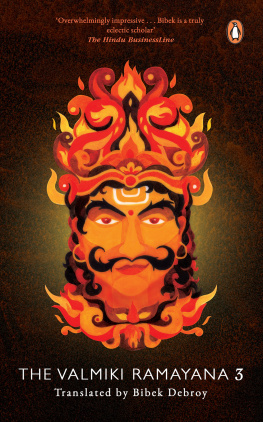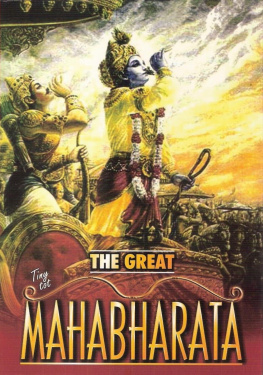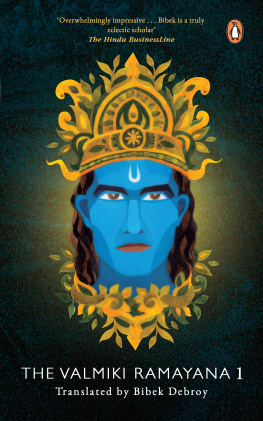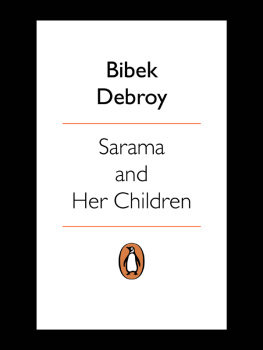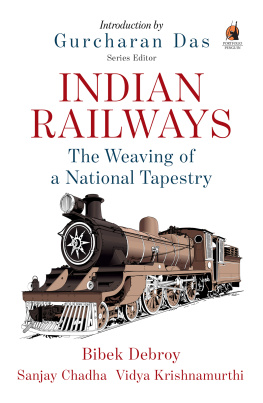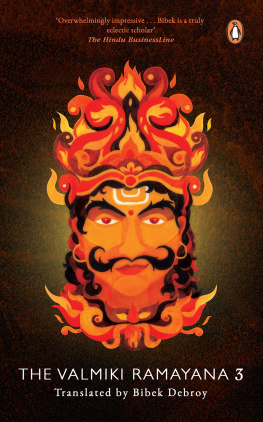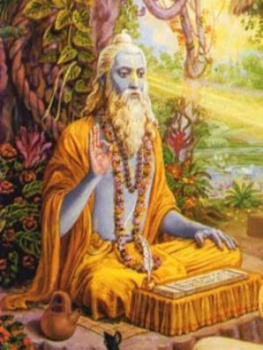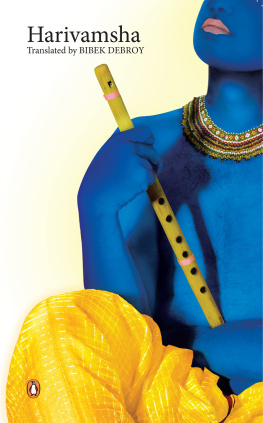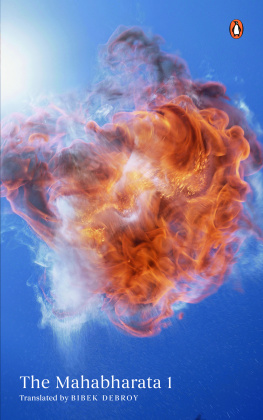Bibek Debroy - Mahabharata Vol-8
Here you can read online Bibek Debroy - Mahabharata Vol-8 full text of the book (entire story) in english for free. Download pdf and epub, get meaning, cover and reviews about this ebook. year: 0, genre: Religion. Description of the work, (preface) as well as reviews are available. Best literature library LitArk.com created for fans of good reading and offers a wide selection of genres:
Romance novel
Science fiction
Adventure
Detective
Science
History
Home and family
Prose
Art
Politics
Computer
Non-fiction
Religion
Business
Children
Humor
Choose a favorite category and find really read worthwhile books. Enjoy immersion in the world of imagination, feel the emotions of the characters or learn something new for yourself, make an fascinating discovery.

- Book:Mahabharata Vol-8
- Author:
- Genre:
- Year:0
- Rating:3 / 5
- Favourites:Add to favourites
- Your mark:
- 60
- 1
- 2
- 3
- 4
- 5
Mahabharata Vol-8: summary, description and annotation
We offer to read an annotation, description, summary or preface (depends on what the author of the book "Mahabharata Vol-8" wrote himself). If you haven't found the necessary information about the book — write in the comments, we will try to find it.
Mahabharata Vol-8 — read online for free the complete book (whole text) full work
Below is the text of the book, divided by pages. System saving the place of the last page read, allows you to conveniently read the book "Mahabharata Vol-8" online for free, without having to search again every time where you left off. Put a bookmark, and you can go to the page where you finished reading at any time.
Font size:
Interval:
Bookmark:




SECTION SEVENTY-EIGHT
SOUPTIKA PARVA
Ashvatthama sees an owl kill sleeping crows and decides that the Pandavas and Panchalas should be killed in the night, while they are asleep
SECTION SEVENTY-NINE
AISHIKA PARVA
Ashvatthama and Arjuna invoke their brahmashira weapons, which threaten to destroy the worlds; Arjuna withdraws his and Ashvatthamas is diverted towards the wombs of the Pandava women
SECTION EIGHTY
VISHOKA PARVA
Vidura attempts to dispel Dhritarashtras sorrow
SECTION EIGHTY-ONE
STRI PARVA
Pandavas meet Dhritarashtra and Gandhari; Dhritarashtra wants to crush Bhima to death, but is offered an iron image instead by Krishna; Vedavyasa dissuades Gandhari from cursing the Pandavas; Gandharis glance distorts Yudhishthiras nails
SECTION EIGHTY-TWO
SHRADDHA PARVA
The dead warriors are cremated and their funeral rites performed
SECTION EIGHTY-THREE
JALA-PRADANIKA PARVA
The observation of water-rites and the offering of water to the dead warriors takes place; Kunti tells the Pandavas that Karna was their elder brother
SECTION EIGHTY-FOUR
RAJA DHARMA PARVA
Yudhishthira sorrows over Karna and Narada recounts the story of Karna being cursed and his exploits; Yudhishthira wishes to leave for the forest, but is dissuaded and is asked to learn about dharma from Bhishma; Yudhishthira is crowned
SECTION EIGHTY-FIVE
APAD DHARMA PARVA
Bhishma instructs Yudhishthira about the nature of dharma to be followed during a misfortune or a calamity
SECTION EIGHTY-SIX
MOKSHA DHARMA PARVA
Bhisma talks about moksha, which means liberation, as opposed to the pursuit of dharma, artha and kama
For Suparna
The modernization of language is visible, its easier on the mind, through expressions that are somewhat familiar. The detailing of the story is intact, the varying tempo maintained, with no deviations from the original. The short introduction reflects a brilliant mind. For those who passionately love the Mahabharata and want to explore it to its depths, Debroys translation offers great promise in the first volume.
Hindustan Times
[Debroy] has really carved out a niche for himself in crafting and presenting a translation of the Mahabharata The book takes us on a great journey with admirable ease.
The Indian Express
The first thing that appeals to one is the simplicity with which Debroy has been able to express himself and infuse the right kind of meanings Considering that Sanskrit is not the simplest of languages to translate a text from, Debroy exhibits his deep understanding and appreciation of the medium.
The Hindu
Overwhelmingly impressive Bibek is a truly eclectic scholar.
Business Line
Debroys lucid and nuanced retelling of the original makes the masterpiece even more enjoyably accessible.
Open
The quality of translation is excellent. The lucid language makes it a pleasure to read the various stories, digressions and parables.
The Tribune
Extremely well-organized, and has a substantial and helpful Introduction, plot summaries and notes. The volume is a beautiful example of a well thought-out layout which makes for much easier reading.
The Book Review
The dispassionate vision [Debroy] brings to this endeavour will surely earn him merit in the three worlds.
Mail Today
This [second] volume, as voluminous as the first one, is expectedly as scholarly Like the earlier volume, the whole book is an easy read.
The Hindu
Debroys is not the only English translation available in the market, but where he scores and others fail is that his is the closest rendering of the original text in modern English without unduly complicating the readers understanding of the epic.
Business Standard
The brilliance of Ved Vysya comes through [in Volume 3], ably translated by Bibek Debroy.
Hindustan Times
Bibek Debroy is an economist and is Research Professor (Centre of Policy Research) and a columnist with Economic Times. He has worked in universities, research institutes, industry and for the government. He has published books, papers and popular articles in economics. But he has also published in Indology and translated (into English) the Vedas, the Puranas, the Upanishads and the Gita (Penguin India, 2005). His book Sarama and her Children: The Dog in Indian Myth (Penguin India, 2008) splices his interest in Hinduism with his love for dogs. He is currently translating the remaining volumes of the unabridged Mahabharata.
Ardha bhry manu yasya bhry rehatama sakh
Bhry mulam trivargasya bhry mitram mariyata
Mahabharata (1/68/40)
Nsti bhrysamo bandhurnsti bhryasam gati
Nsti bhrysamo loke sahyo dharmasdhana
Mahabharata (12/142/10)





The Hindu tradition has an amazingly large corpus of religious texts, spanning Vedas, Vedanta (brahmanas, smritis, Puranas, dharmashastras and itihasa. For most of these texts, especially if one excludes classical Sanskrit literature, we dont quite know when they were composed and by whom, not that one is looking for single authors. Some of the minor Puranas (Upa Purana) are of later vintage. For instance, the Bhavishya Purana (which is often listed as a major Purana or Maha Purana) mentions Queen Victoria.
In the listing of the corpus above figures itihasa, translated into English as history. History doesnt entirely capture the nuance of itihasa, which is better translated as this is indeed what happened. Itihasa isnt myth or fiction. It is a chronicle of what happened; it is fact. Or so runs the belief. And itihasa consists of Indias two major epics, the Ramayana and the Mahabharata. The former is believed to have been composed as poetry and the latter as prose. This isnt quite correct. The Ramayana has segments in prose and the Mahabharata has segments in poetry. Itihasa doesnt quite belong to the category of religious texts in a way that the Vedas and Vedanta are religious. However, the dividing line between what is religious and what is not is fuzzy. After all, itihasa is also about attaining the objectives of
Font size:
Interval:
Bookmark:
Similar books «Mahabharata Vol-8»
Look at similar books to Mahabharata Vol-8. We have selected literature similar in name and meaning in the hope of providing readers with more options to find new, interesting, not yet read works.
Discussion, reviews of the book Mahabharata Vol-8 and just readers' own opinions. Leave your comments, write what you think about the work, its meaning or the main characters. Specify what exactly you liked and what you didn't like, and why you think so.

